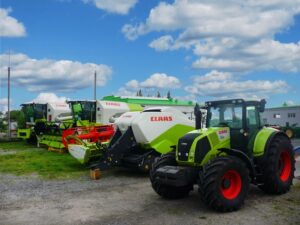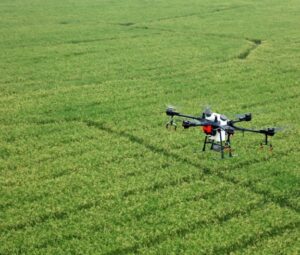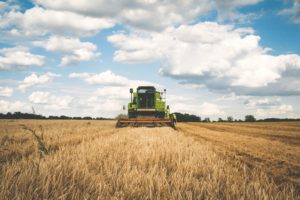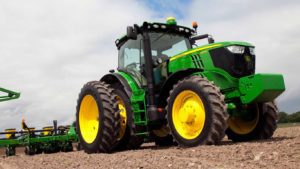
On Tuesday, the government of Ukraine allocated an additional UAH 2.3 billion to the Affordable Loans 5-7-9 program, under which the Cabinet of Ministers compensates the interest rate, Prime Minister Denys Shmyhal said.
“We have also reformatted this program. Now every entrepreneur can get a loan at 0% in the amount of up to UAH 60 million. The state will pay the interest to the bank,” he said in his address on Tuesday evening.
Shmygal stressed that the restart and resumption of business is a necessary condition for the sustainability of the economy.
The prime minister also noted that the government is providing assistance to farmers, and the sowing campaign has already begun in all regions, except for Luhansk.
“We have provided them (agrarians) with concessional financing for UAH 3.5 billion. At today’s meeting of the government, they decided to simplify the registration of agricultural machinery as much as possible. We are doing this so that sowing work in the field does not stop anywhere,” Shmyhal said.
Earlier on Tuesday, the Ministry of Finance announced that within the framework of the program “Affordable loans 5-7-9” from February 21 to April 11, 1,391 loans were issued for a total of UAH 3.95 billion.

The processing of agricultural crops using unmanned aerial vehicles is the most promising direction in the Ukrainian agricultural machinery industry, the Astarta agricultural holding has begun experimental implementation of this type of aviation this year, CEO of AgriChain, which is part of Astarta, Natalia Bohacheva has said.
“Drones are the most promising direction in Ukraine today. We use the drone scouting. These are video inspections and panoramic images of fields at different heights, at different angles with satellite monitoring,” she told Interfax-Ukraine on the sidelines of the Ukraine CFO Forum in Kyiv held last week.
According to her, drones are most effective in assessing the state of crops and promptly responding to emerging risks. In addition, this aircraft technology allows pre-harvest drying of grain crops with greater efficiency than using wheeled vehicles. This is especially pronounced during desiccation of rapeseed, which can be significantly damaged by the bottom of the vehicles processing it.
Bohacheva said that pilot schemes for processing crops with drones were introduced at a number of enterprises of the agricultural holding this year, mainly for rapeseed.
“I myself was a huge skeptic of drone treatments, especially in terms of refueling and charging, but the case with desiccation confirmed their effectiveness,” the head of AgriChain said.
AgriChain is a product company that develops solutions for the AgTech market, founded in 2016 by the Astarta agricultural holding.
According to the unified public register of legal entities and sole proprietors, 99.8% of the charter capital of Agri Chain LLC belongs to Astarta CEO Viktor Ivanchyk through Astarta-Kyiv LLC.
Astarta is a vertically integrated agro-industrial holding operating in eight regions of Ukraine.

Astarta agricultural holding, the largest sugar producer in Ukraine, has launched the first phase of a five-year investment program to update agricultural machinery and introduce IT instruments for agricultural management of AgriChain company, which is part of the agricultural holding structure.
According to the statement on Astarta’s website, the investments in 2020 were aimed at purchasing 31 tractors (John Deere), 21 grain, row crops and beet seeders (John Deere, Horsch Maestro, Pöttinger Terrasem, Kinze, Monopil, Amity Technology).
In addition, as part of the investment program, two self-propelled sprayers (John Deere), four cultivators (Amity Technology), three seed harrows of Ukrainian production and ten sets of vacuum systems for the conversion of row seeders were purchased.
New John Deere tractors with a capacity of 345 hp equipped with accurate navigation and telemetry systems that will integrate with AgriChain Farm and AgriChain Scout modules.
“The data obtained in real time will provide an opportunity to receive information, form informed decisions and create accurate daily tasks to increase technological field operations,” Astarta reported.
The agricultural holding said that in a few weeks Astarta will begin the spring sowing campaign, preparations for which are ongoing. In particular, winter wheat fertilizing is being completed and soil is being prepared for sowing spring crops.
The company’s crop rotation in 2020 will not change, since traditionally the main spring crops are sugar beets (35,000 hectares), corn (65,000 hectares), soybean (28,000 hectares) and sunflower (41,000 hectares).
Astarta is a vertically integrated agro-industrial holding operating in eight regions of Ukraine. It consists of eight sugar factories, agricultural enterprises with a land bank of 243,000 hectares and dairy farms with 25,000 animals, seven elevators, a biogas complex and a soybean processing plant in Poltava region (Globino Processing Plant LLC).
After three years of profitable work in 2018, Astarta received a net loss of EUR 21.11 million. Its revenue decreased by 18.8%, to EUR 372.22 million, and EBITDA fell by 52.4%, to EUR 56.87 million in 2018.
The AgriChain Farm module is designed to operate and communicate across all production services. It combines all the stages and processes of the production chain: from planning to execution and reflection. The AgriChain Scout information system is currently at the final stages of testing. It combined monitoring of the state of crops, agrochemical field certificates, meteorological data, plant vegetation status (NDVI), systematic monitoring of crops and assessment of its condition, etc.
Other modules are under development and are simultaneously being tested as pilot projects at Astarta’s subsidiary agricultural companies.

Ukrainian manufacturers of agricultural machinery has said it is necessary to reduce the local contents of domestic complex agricultural machinery set for 2019-2021 that should be observed for receiving a partial compensation for the cost of machinery and equipment.
UkrAgroMash Association of Agricultural Machinery and Equipment Manufacturers addressed to First Deputy Premier of Ukraine Stepan Kubiv with the respective request, the text of which was made available by the National Committee on Industrial Development on Facebook.
“Under present intense competition with the companies from other countries, which can afford cheap loans and enjoy various incentives and financial support of their countries…it becomes more difficult for the Ukrainian producers to uphold their position in the market and increase the local content with having no such kind of support,” reads the report.
The association says current year business realities make it impossible for the manufacturers of the complex self-propelled machinery to gain local contents, which have been set in 2013, for 2019/2020.
Thus, it is proposed to set local contents for self-propelled combine harvesters on the level of 40% in 2019, on the level of 45% in 2020, and on the level of 50% in 2021 (now these indicators are 55% and 60% respectively in 2019 and 2020), to set 45% and 50% contents for tractors for 2019 and 2020 (previously 55% and 60%), and 55% for 2021.
Besides, the manufacturers propose to fix local contents for special-purpose agricultural machines this and next years on the level of 50% and 55% (previously 55% and 60%), and 60% for 2021, local contents for self-propelled spraying machines on the level of 40% and 45% (55% and 60%) and introduce 50% for 2021.
The farm producers also ask to introduce spraying trailer machines into the list setting 45% of local content for 2019, 50% in 2020 and 55% in 2021.
As reported, the program of financial support for agricultural producers (subsidies for the purchase of agricultural machinery, equipment, railway cars) is about UAH 881.8 million. Of these, partial compensation for the cost of agricultural machinery and equipment made in Ukraine is UAH 681.79 million, special vehicles for the transportation of grain, equipment for the production of bioethanol and electricity from biomass, which were purchased from domestic producers – UAH 200 million.
AGRICULTURAL MACHINERY, GOVERNMENT, HARDWARE, LOCAL CONTENT, MANUFACTURERS

CFG/Mriya agricultural holding, which has been operating as a single business since early 2019, in March bought agricultural machinery for the amount of $2.3 million, the press service of the company has reported.
The agricultural holding said that it bought 17 trailing units of agricultural machinery: 12 band spreaders and five cultivators. Deutsche Agrotechnik Ukraine, Rauch Landmaschinenfabrik GmbH and UAPC LLC supplied the machinery.
“This is the first of the planned deliveries of equipment for the CFG/Mriya joint agricultural holding this year. The general investor, Salic UK Ltd, intends to send several dozens of millions of dollars to update the CFG/Mriya fleet in 2019 to ensure further effective activity of the merged company,” the company said in a press release.
Mriya Agro Holding is a vertically integrated agribusiness, which was founded by Ivan Huta in 1992. The holding’s land bank is 165,000 hectares. Its grain elevators are able to store 380,000 tonnes.
In August 2014, Mriya reported an overdue payment of about $9 million in interest income and about $120 million in repayment of debt on its obligations. The total debt to all financial creditors, taking into account the guarantees provided to the companies related to the Huta family, was about $1.3 billion at the time of the holding’s default.
In early February 2015, the operating control of the holding was transferred to creditors who elected the new management, and in September 2016 the committees of creditors and bondholders of the holding agreed on the conditions for the restructuring of the company’s debt, which was estimated at $1.1 billion. The debt restructuring ended in August 2018. Mriya’s total debt burden decreased from $1.1 billion to $309.5 million, which included $49.3 million in restructured secured debt, $208.1 million in restructured unsecured debt (eurobonds), $46 million in working capital, and $6.1 million in assets under a new leasing program for the purchase of equipment.
In September 2018, SALIC UK Limited announced the acquisition of the holding. The deal was completed in November 2018.
Mriya will continue operations in Ukraine together with SALIC UK’s subsidiary, CFG.
The Saudi Agricultural and Livestock Investment Company (SALIC) was founded in 2012. Its sole shareholder is the Sovereign Fund of Saudi Arabia. The company invests in the production of agricultural and livestock products.
CFG has been operating in Ukraine since 2006. It processes 45,000 hectares in Lviv and Ternopil regions.